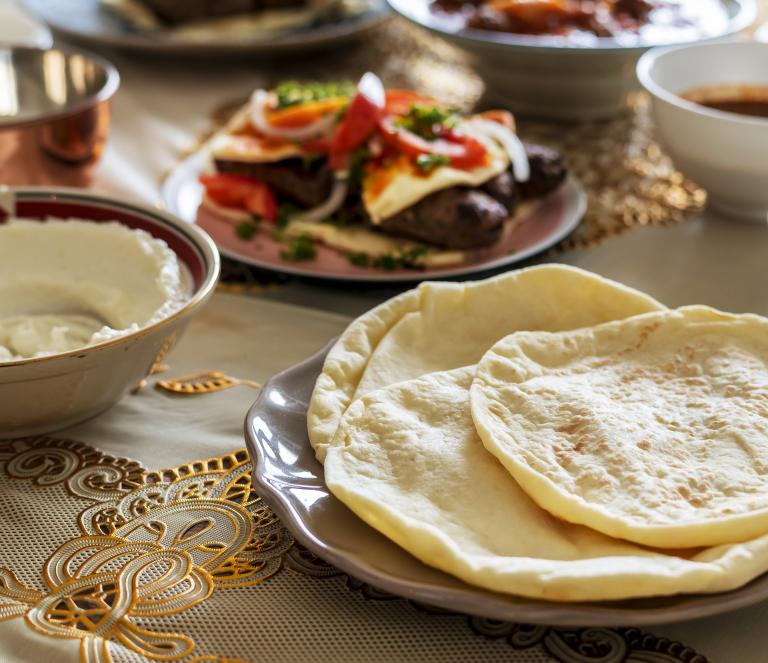
NbA Muslims Staff
As Muslims across the globe prepare what may be their last iftar for this Ramadan, we decided to share Laura El-Alam’s descriptions of the different types of people that may be at the table when breaking the fast.
The Moaner

While The Moaner likely spent the whole day stoically enduring their fast at school or work, their personality morphs once they enter the sanctuary of their home. As their name implies, The Moaner expresses their discomfort vocally, usually in the last 1-2 hours before sunset. Placing themselves in a centrally-located part of the home, The Moaner will assume a dramatic position (slumped over in a kitchen chair with their head buried in their arms, for instance) and begin their wailing. “I’m so huuuuungry!” “My throat is so dryyyyyy!” The Moaner is best ignored, especially since their mood will improve drastically within two minutes of eating and drinking.
The Timekeeper

A family can always rely on The Timekeeper to give frequent updates on the hours and minutes left until iftar. Depending on their level of hunger, the updates might start as early as five hours before breaking the fast. “Five hours and eighteen minutes to go,” they might report, with a hint of desperation in their voice. (It’s no coincidence that The Timekeeper is frequently also a Moaner). Their updates increase in frequency up until sunset, and the last few agonizing minutes before iftar are punctuated with constant updates. “Three minutes to go!” “One minute and thirty-five seconds!” “And . . . NOW!” Thanks to The Timekeeper, alarms are unnecessary. Earplugs might be worth considering, though.
The Cook

The last hour(s) before iftar usually pass quickly for The Cook, who is always busy in the kitchen. The Cook’s job in Ramadan is complicated by more- difficult-than-usual time management (trying to get the food done, but not overcooked, at the exact minute of the sunset) and the inability to taste the food or sneak tasty morsels as they go along. Also, the Cook is tempted throughout the process by delicious fragrances, making their mouth water constantly. The Cook’s efforts are thwarted by many others, profiled below.
The Hoverer

This is the person who — perhaps subconsciously trying to speed up time — keeps visiting the kitchen. The Hoverer is the nemesis of The Cook because they are constantly lifting lids to smell the soup, opening the refrigerator, or taking up a spoon to stir the sauces. In addition to getting in the way physically, The Hoverer also tends to disrupt The Cook’s concentration. With “helpful” suggestions like “Don’t add too much salt. But don’t add too little, either!” and “forward-thinking” questions like “What’s for suhoor?” “What are you making for iftar tomorrow?”, the Hoverer is likely to get on The Cook’s last nerve. They are best dealt with by giving them tasks: setting the table, filling water glasses, or making uncomplicated dishes like fruit salad, depending on their age and skill level.
The Potato

The last hour or two before sunset are too much for The Potato to handle. They spend this time reclined in a chair or bed, silent and motionless. They are not helpful, nor are they bothersome. One hopes they are using their quiet time productively, making duaa‘ or dhikr. Interestingly, The Potato sometimes becomes the most boisterous and hyper person in the household after they have broken their fast.
The Accidental Eater

This absentminded person can’t seem to overcome their nibbling proclivities. Trays of tempting foods are unsafe around the Accidental Eater, who frequently pops a grape or a bite of samosa in their mouth without thinking. After a few chews, the Accidental Eater usually realizes their grave mistake, groans in horror, and runs to the trash can to spit it out. Accidental Eaters should be kept far from the table and kitchen until the sun has set. Supervising the children in another room is an excellent job for this unfortunate personality type. Cooks who tend to be Accidental Eaters might want to consider duct-taping their lips closed.
The Non-fasters

Young children and adults who are, for various reasons, exempt from fasting are sometimes among the pre-iftar group. Their cheerfulness and high energy level are a stark contrast to the fasters’ subdued spirit and lackluster energy. The children, who have often been fed hours before sunset, inevitably start acting up right before iftar, distracting the frazzled Cook, climbing on The Potato, giggling at The Moaner, and questioning The Timekeeper. “Why do you keep yelling the time?” “How long is 30 minutes?” “How many seconds are there in 3 hours and 17 minutes?” Non-fasters should have their own room — or preferably their own house — during Ramadan.
The Patient

This Muslim follows the Sunnah of the Prophet SAAW and is even-tempered, helpful, and productive up until iftar. I believe almost everyone strives to achieve this status, but we are, alas, works in progress. Perhaps someday The Accidental Eater, The Non-fasters, The Potato, The Cook, The Hoverer, and even The Moaner will perfect their Ramadan etiquette, inshaAllah, and wind up as The Patient.












